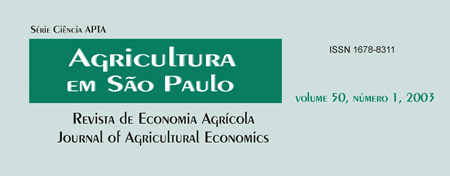
Maria
do Carmo Ramos Fasiaben
Mirian
Rumenos Piedade Bacchi
Fernando
Curi Peres
O presente trabalho foi conduzido com a finalidade de entender o processo de tomada de decisão, em condições de risco, de dois tipos extremos de sistemas de produção, ambos de natureza familiar, mas com dotações diferentes de recursos produtivos (um minifundista e um grande produtor). As propriedades desses agricultores localizam-se no município de Boa Ventura de São Roque, na região centro-sul do Paraná, e têm a soja como principal atividade produtiva. A Programação Linear foi utilizada para modelar os sistemas de produção das uni-dades familiares consideradas na análise, e o modelo de Minimização do Desvio Absoluto Total (MOTAD) foi empregado para construção da fronteira eficiente, que representa o risco envol-vido para a obtenção de determinados níveis de margem bruta. Contrariamente ao esperado, os resultados mostraram que o pequeno produtor apresentou taxa de aversão ao risco menor que a do grande, dada a combinação de atividades de seu sistema atual de produção. A análise de dois tipos extremos de sistemas de produção pretende evidenciar que políticas diferenciadas são requeridas para atender à diversidade de situações que compõem o universo da agricultura familiar.
Palavras-chaves: fronteira de eficiência, sistemas de produção, risco, agricultura familiar, Estado do Paraná, estudos de caso.
case studies of family production systems in the mid-south area of Paraná, Brazil
The aim of this study was to analyze the decision-making process, under risk conditions, of two extreme types of production systems. Both were family businesses, despite the great difference in production resources (a small farm owner and a great producer). These farms are located in the town of Boa Ventura de São Roque, in the central area of the southern part of the state of Paraná, and have soybean as their main production activity. Linear Programming was used to model the production systems of the family units considered in the analysis. The MOTAD (Minimization of Total Absolute Deviation) was used for the construction of the efficient frontier, which represents the risk involved for obtaining certain levels of gross margin. Contrary to what was expected, the results showed that the rate of risk aversion for the smaller producer was lower than that for the larger producer, given the combination of activities of their current production systems. The analysis of two extreme types of production systems intend to make clear that different policies are required to satisfy the diversity of situations that make up the universe of family farming.
Key-words: efficient frontier, production systems, risk, family agriculture, state of Paraná, case studies.